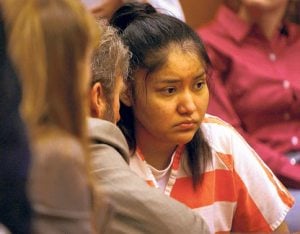TUCSON - A young woman convicted of first-degree murder for the 2007 stabbing death of her University of Arizona dorm mate was sentenced Tuesday to life in prison without the possibility of parole.
Galareka Harrison, 19, of Chinle, was convicted Sept. 19 in the slaying of Mia Henderson, 18, of Tuba City, whom authorities said was stabbed 23 times. Both freshman students were members of the Navajo Nation.
Prosecutors didn’t seek the death penalty.
Superior Court Judge Nanette Warner heard four hours of testimony Monday from relatives of both girls offering aggravating and mitigating factors to be taken into account at the sentencing.
“You killed in a very violent way — there’s just no way around that,” she told Harrison on Tuesday.
The judge said that she had been impressed through the trial by the demeanor of the two women’s families and the many other Navajos who had also sat through the trial proceedings. “It gave me a much deeper sense of respect for your community, your lives and your culture,” Warner said.
“Both girls came from very good families, who wanted nothing but the best for their children.”
She added, “This crime has profoundly affected both families. I came away with a sense that Mia Janelle was such a special person — very accomplished beyond her years.”
Harrison’s attorney, assistant Public Defender John O’Brien, called the killing “a crime of passion” and said, “Galareka is truly, truly sorry for the pain that she has caused.”
When asked whether Harrison wanted to speak before being sentenced, O’Brien, said, “She’s very, very overwhelmed right now.”
But in a soft, halting voice, Harrison said, “I just want everybody to know that we all suffered from this.”
Prosecutor Rick Unklesbay said Harrison had planned the incident for days after Henderson had accused her of stealing her student ID charge card, a Social Security card, checks and $500 from a bank account.
He noted that on a trip home and back to school with another student before the stabbing, she spoke of having a friend who was discussing suicide and asked whether fingerprints could be detected through gloves. Then Harrison bought an 8-inch kitchen knife on the return trip.
She wrote a fake suicide note pretending to be Henderson, checked to see whether Henderson had fallen asleep in their dorm room and then spent time “thinking and thinking and thinking and thinking” before she attacked on Sept. 5, 2007, Unklesbay said.
The prosecutor said this murder case was unique in terms of the “ripple effect” Henderson’s death had on her own and extended families, but also on the entire Navajo Nation and the university community.
He noted Henderson’s dreams of becoming a doctor or geneticist and returning to the reservation to help her people.
After the sentencing, Unklesbay said, “The Navajo Nation has lost someone who was going to be a star.”
Henry Henderson, the victim’s father, said only “I’m at a loss for words.”
O’Brien had asked Warner to impose a life sentence with eligibility for parole after 25 years, “because it allows for the possibility of hope and the possibility of redemption.” But the judge rejected that option.
Harrison also was found guilty of three forgery counts and one count of identity theft. Warner sentenced Harrison to 2½ years for each of those counts, to be served concurrently with the life sentence.









